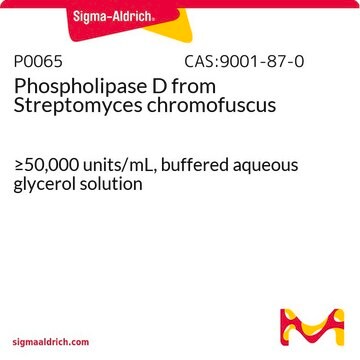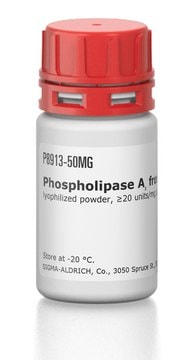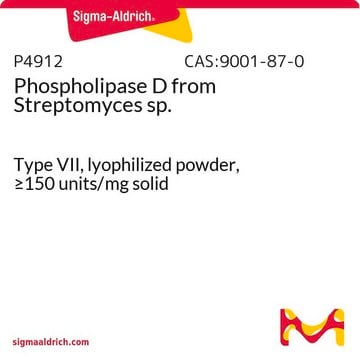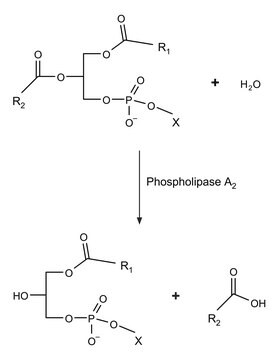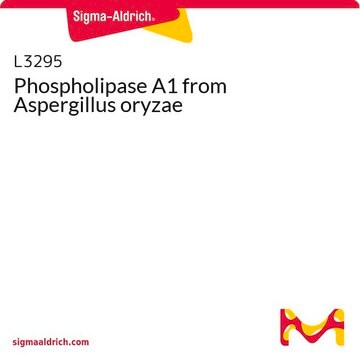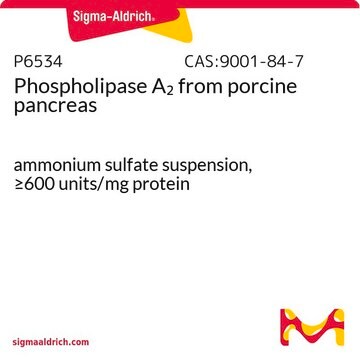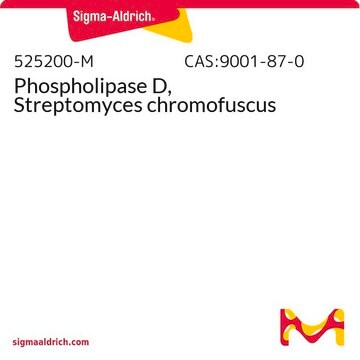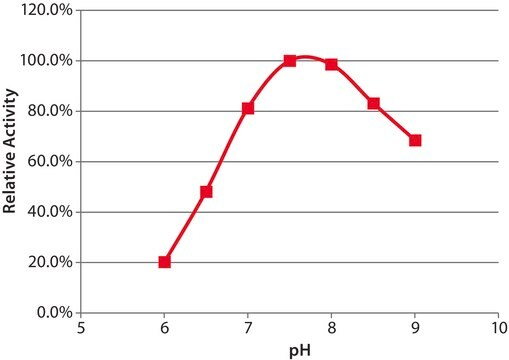P8398
Phospholipase D from cabbage
Type IV, lyophilized powder, ≥100 units/mg solid
Synonym(s):
Lecithinase D, Phosphatidylcholine phosphatidohydrolase, Phospholipase D from white cabbage
Sign Into View Organizational & Contract Pricing
All Photos(1)
About This Item
Recommended Products
type
Type IV
Quality Level
form
lyophilized powder
specific activity
≥100 units/mg solid
composition
Protein, ~25%
storage temp.
−20°C
Looking for similar products? Visit Product Comparison Guide
General description
Phospholipase D (PLD) from cabbage comprises the C2 domain, PLD superfamily specific conserved regions (I–IV) with HxKx4Dx6GSxN (HKD) motif. Structurally, it is a barrel-shaped monomer bound to calcium ions.
Application
Phospholipase D (PLD) is used to hydrolyze the phosphate bonds of phospholipids and sphingomyelin to give the corresponding phosphatidic acid. It has also been used to study metabolic labeling and direct imaging of choline phospholipids in vivo by measuring propargyl-Cho incorporation. Furthermore, PLD is used in purification and kinetic studies.
The enzyme has been used for the preparation of Bodipy-phosphatidylcholine during the preparation of fluorescently labelled lipids.
Biochem/physiol Actions
Phospholipase D from cabbage is widely used in biocatalytic transphosphatidylation reactions.
The amino acid sequence of cabbage PLD has 83% and 80% identity with Arabidopsis PLDα and castor bean PLD. It hydrolyzes the phosphate bonds of phospholipids and sphingomyelin to give the corresponding phosphatidic acid.
Hydrolyzes the phosphate bonds of phospholipids and sphingomyelin to give the corresponding phosphatidic acid.
Unit Definition
One unit will liberate 1.0 μmol of choline from L-α-phosphatidylcholine (egg yolk) per hr at pH 5.6 at 30 °C.
Analysis Note
Protein determined using biuret.
inhibitor
Product No.
Description
Pricing
Signal Word
Danger
Hazard Statements
Precautionary Statements
Hazard Classifications
Resp. Sens. 1
Storage Class Code
11 - Combustible Solids
WGK
WGK 3
Personal Protective Equipment
dust mask type N95 (US), Eyeshields, Gloves
Choose from one of the most recent versions:
Certificates of Analysis (COA)
Lot/Batch Number
Don't see the Right Version?
If you require a particular version, you can look up a specific certificate by the Lot or Batch number.
Already Own This Product?
Find documentation for the products that you have recently purchased in the Document Library.
Customers Also Viewed
Susanne Stumpe et al.
The FEBS journal, 274(10), 2630-2640 (2007-04-25)
Phospholipases D play an important role in the regulation of cellular processes in plants and mammals. Moreover, they are an essential tool in the synthesis of phospholipids and phospholipid analogs. Knowledge of phospholipase D structures, however, is widely restricted to
Premysl Pejchar et al.
The New phytologist, 188(1), 150-160 (2010-07-16)
• Aluminium ions (Al) have been recognized as a major toxic factor for crop production in acidic soils. This study aimed to assess the impact of Al on the activity of phosphatidylcholine-hydrolysing phospholipase C (PC-PLC), a new member of the
T T Allgyer et al.
Biochemistry, 18(24), 5348-5353 (1979-11-27)
Phospholipase D has been purified 680-fold from an acetone powder of savoy cabbage in an overall yield of 30%. The purification involves solubilization of the acetone powder in a Ca2+-containing buffer and subsequent ammonium sulfate fractionation. Gel filtration on Sephadex
Cindy Y Jao et al.
Proceedings of the National Academy of Sciences of the United States of America, 106(36), 15332-15337 (2009-08-27)
Choline (Cho)-containing phospholipids are the most abundant phospholipids in cellular membranes and play fundamental structural as well as regulatory roles in cell metabolism and signaling. Although much is known about the biochemistry and metabolism of Cho phospholipids, their cell biology
D U Kim et al.
Biochimica et biophysica acta, 1437(3), 409-414 (1999-04-02)
We cloned and expressed a full-length cDNA encoding a phospholipase D of type alpha (PLDalpha) from cabbage. Analysis of the cDNA predicted an 812-amino-acid protein of 92.0 kDa. The deduced amino acid sequence of cabbage PLD has 83% and 80%
Our team of scientists has experience in all areas of research including Life Science, Material Science, Chemical Synthesis, Chromatography, Analytical and many others.
Contact Technical Service